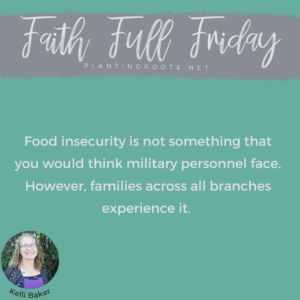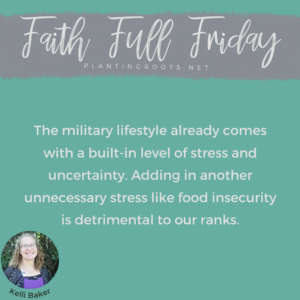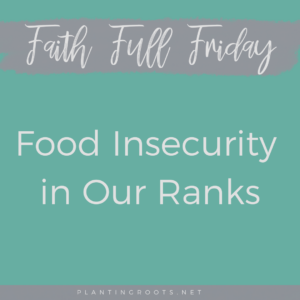Join Deputy Director of Publishing Kelli Baker as she discusses food insecurity in our ranks and its effects on mission readiness.
Food Insecurity in Our Ranks: its Effects on Mission Readiness
by Kelli Baker
Families in our ranks are hurting for food. It is estimated that 25.8 percent of personnel across all branches of the military experience food insecurity in a study conducted by the DOD in 20181. Food insecurity is not something that you would think military personnel face. However, families across all branches experience it.
Food Insecurity
What is food insecurity? According to the U.S. Department of Agriculture (USDA), food insecurity is the lack of steady access to enough food for an active, healthy lifestyle2. Therefore, the fact that over a quarter of the men and women in our ranks are living with food insecurity should give us pause. What is even more concerning is that the rate at which food insecurity affects military members is double that of our civilian counterparts. 
When thinking about who may be food insecure, your mind might automatically jump to lower enlisted personnel. However, studies have shown that instances of personnel in mid-career in grades E-4 for E-6 were greater than those in grades E-1 to E-3. The military has recognized the disparity and has worked to close the gap. In the Army’s Holistic Health and Fitness guidance, nutritional readiness states that Soldiers must place as much emphasis on nutritional programming to support physical and mental health and performance3.
Mission Readiness
Mission readiness is the goal of the Army’s Holistic Health and Fitness guidance. However, as followers of Jesus, we should be concerned about the overall health and wellness of all of God’s children. Jesus says in Luke 3:11, “Whoever has two tunics is to share with him who has none, and whoever has food is to do likewise.”
Without food, a Soldier is distracted. Studies indicate “that mothers are more stressed when food is unpredictably available.” (Stossel, p. 375). The study further concludes that the stress hormones the mother experiences are taken on by the children, which has been proven to have a lasting impact. Children who have grown up in a high-stress environment will grow up to have greater anxiety. (Attribute to Stossel).
Stress and anxiety are only symptoms of the more significant problem. A mother is distracted when she has to constantly worry about where the next meal will come from.
- She is unable to focus on the task at hand.
- She can become irritable and annoyed by the smallest things.
- She is unable to be the best mother and wife she can be.
Not to mention, the cost of food has risen 9.9 percent3. Soldiers who cannot afford to purchase food for themselves and their families suffer. The military lifestyle already comes with a built-in level of stress and uncertainty. Adding in another unnecessary stress like food insecurity is detrimental to our ranks.
Like Christ
When we show concern for those who may not have food among our ranks, we are acting like Christ. Christ offered himself as a living sacrifice so that none would go hungry or thirsty again. While mission readiness and food insecurity in our ranks are essential, there are souls among our ranks that are hungry and thirsty as well. As we open our eyes and look around for those who are physically hungry, we will recognize their spiritual hunger as well. 
Jesus multiplied two fish and five loaves for over 5,000 people to show that he can and will provide for the physically hungry. But he did not physically feed them to simply fill their bellies. He used it as an opportunity to fill their souls as well. We can do the same as we minister to those around us in their physical hunger. As we feed them physically, we can point them to the Bread of Life who will satisfy their hunger in ways we could never satisfy them.
Why Does Food Insecurity Matter to Me?
Indeed, we can see that food insecurity is more than an individual problem. Wives and mothers are forced to uproot their families either for their own careers or for the career of their husbands. The added consequence of the uncertainty of where the next meal will come from impacts the military community as a whole. Our military force is not as strong as it can be when families are hungry.
Jesus set the example for us during his life here on earth. He continually made concessions for the poor. In Matthew 19, Jesus tells of a parable where he calls on the rich man to sell his possessions and give to the poor (verse 21). Jesus said God would reward those who feed the hungry, provide them with drink, and clothe them (Matthew 25:34-36). For those blessed to have food on their table, we are called to give to those who need it.
Closing Prayer
Dear Heavenly Father, thank you for coming to satisfy the souls of the hungry. Help us see those around us who may be physically hungry and help us to feed them both physically and spiritually so they may find healing and wholeness in you, Lord Jesus. Amen.
Notes and Resources
- Food Insecurity in the U.S. Military: Responses to Eight Topics Raised by Congress | RAND
- Defense Official Says Food Insecurity Is a Readiness, National Security Issue > U.S. Department of Defense > Defense Department News
- USDA ERS – Summary Findings
- Stossel, S. (2015). My Age of Anxiety: Fear, Hope, Dread, and the Search for Peace of Mind. Vintage Publishing. Accessed on Feb 5, 2023.
- Click here to see our Month of the Military Child Resource.
- Click here to see our Women’s History Month Resource List.
- Click here to see our Heart Healthy Relationship Resource List.
- Click here to see our Women’s Empowerment Resource List.
- Check out this post if you want a reminder of what our Faith Full Friday series is all about.






